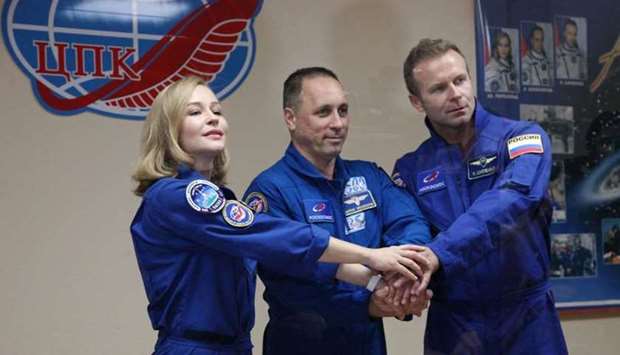Russia on Tuesday is set to launch an actress and film director into space in a historic bid to best the United States to film the first movie in orbit.
If successful, the Russian crew will beat a Hollywood project that was announced last year by "Mission Impossible" star Tom Cruise together with NASA and Elon Musk's SpaceX.Actress Yulia Peresild, 37, and film director Klim Shipenko, 38, are expected to take off from the Russia-leased Baikonur Cosmodrome in ex-Soviet Kazakhstan at 0855 GMT.
Led by veteran cosmonaut Anton Shkaplerov, they will travel in a Soyuz MS-19 spaceship for a 12-day mission at the International Space Station (ISS) to film scenes for "The Challenge".
The movie's plot, which has been mostly kept under wraps along with its budget, was revealed by Russia's space agency Roscosmos to centre around a female surgeon who is dispatched to the ISS to save a cosmonaut.
Shkaplerov and two other Russian cosmonauts aboard the ISS are said to have cameo roles in the film.
"For me, space is alluring, welcoming and has no boundaries," Peresild -- who was selected out of 3,000 candidates for the role -- said in remarks broadcast by Roscosmos on Tuesday.
Several hours ahead of take off, the trio arrived at the launchpad clad in heavy spacesuits, waving to the crowds as they boarded their spacecraft.
True to a pre-flight tradition religiously observed by cosmonauts, the crew said that on Sunday they watched the classic Soviet film "The White Sun of the Desert".
Shipenko and Peresild are expected to return to Earth on October 17 in a capsule with cosmonaut Oleg Novitsky, who has been on the ISS for the past six months.
"Not only do we need to make a film, we need to come back to Earth alive," Shkaplerov said.
If successful, the mission will add to a long list of firsts for Russia's space industry.
The Soviets launched the first satellite Sputnik, and sent the first animal, a dog named Laika, the first man, Yuri Gagarin, and the first woman, Valentina Tereshkova, into orbit.
But compared to the Soviet era, modern Russia has struggled to innovate and its space industry is struggling to secure state funding with the Kremlin prioritising military spending.
Its space agency is still reliant on Soviet-designed technology and has faced a number of setbacks, including corruption scandals and botched launches.
Russia is also falling behind in the global space race, facing tough competition from the United States and China, with Beijing showing growing ambitions in the industry.
Roscosmos was also dealt a blow after SpaceX last year successfully delivered astronauts to the ISS, costing Russia its monopoly for journeys to the orbital station.
For political analyst Konstantin Kalachev, the space film is a matter of PR and a way to "distract" Russians from the "problems" that Roscosmos is facing.
"This is supposed to inspire Russians, show how cool we are, but I think Russians have completely lost interest in the space industry," Kalachev told AFP.
In a bid to spruce up its image and diversify its revenue, Russia revealed this year that it will be reviving its space tourism programme to ferry fee-paying adventurers to the ISS.
After a decade-long pause, Russia will send two Japanese tourists -- including billionaire Yusaku Maezawa -- to the ISS in December, capping a year that has been a milestone for amateur space travel.
Last month, SpaceX completed the first all-civilian mission to space that took four untrained astronauts on a three-day loop around the Earth's orbit.
The trip followed the missions of billionaire Richard Branson, who spent several minutes in weightlessness in July, and of Amazon-founder Jeff Bezos completing a similar mission just days later.
Later this month, 90-year-old actor William Shatner, known for his portrayal of Captain Kirk in the Star Trek series, will fly to space on a mission with Bezos's Blue Origin.

